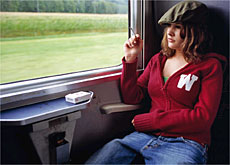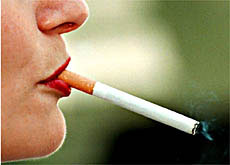Ticino leads fight against passive smoking

Smokers in Italian-speaking Ticino could soon be forced outdoors, if a proposed new law passes in the autumn.
The restrictions are the toughest yet considered in Switzerland and would ban smoking in all public places, including bars and restaurants.
Switzerland’s lax restrictions on smoking are a source of surprise – even amazement – for first-time visitors. Few public places are off-limits to smokers, few restaurants have non-smoking sections, and all trains have smoking carriages.
But the signs are that voters in canton Ticino, a region in southern Switzerland, have had enough. In 2002, no fewer than 11,200 people signed a petition organised by the Ticino-based Swiss Non-Smokers Association calling for political intervention to prevent passive smoking.
Given that just 7,000 signatures are needed to launch a referendum or popular initiative in Ticino, the cantonal authorities were obliged to act.
In 2003, they commissioned a panel of experts to consider the issue, and they concluded that it was in the power of the cantonal government to impose tough new rules to combat passive smoking.
Ban
The panel decided the local authorities could “introduce regulations to ban smoking, particularly in schools, hospitals, shops, meeting rooms, and offices in which a number of people work”. Smoking would be allowed only on separate, specially designated premises.
The issue will be decided in the cantonal parliament in the autumn. If approved, an amendment to the law will be introduced banning smoking in bars and restaurants.
Hoteliers seem to have reacted positively to the idea. “Cleaner air will attract other customers and reduce the costs of maintaining premises and replacing furniture damaged by smoke and cigarette ends,” was the verdict of the associations, which represent them.
The reason for the amendment is to strengthen existing legal provisions, which are reckoned to be inadequate to combat passive smoking.
“Restricting the space available to smokers will undoubtedly reduce their numbers,” says Alberto Polli, president of the association.
Repressive
Other cantons are also considering the issue of passive smoking, but have yet to propose more repressive legislation.
At a federal level, the government has indicated that it favours tougher restrictions on smoking. The Federal Health Office this year made passive smoking the centrepiece of its campaign to prevent tobacco addiction.
“Every year in Switzerland, tobacco consumption is responsible for approximately 8,300 premature deaths, generating costs of around SFr5 billion due to sickness and loss of productivity,” says the office.
In 2001, the cabinet introduced the 2001–2005 National Tobacco Prevention Programme. There are also plans to revise the Federal Ordinance on Tobacco.
Although the draft revision does not envisage radical measures against passive smoking, during the consultation process many political parties and associations called for tougher restrictions.
Public attitude
But the public attitude is hard to gauge. Last month, the director of the Federal Health Office, Thomas Zeltner, suggested banning all tobacco advertising, and gradually hiking the price of cigarettes to SFr7.50 a packet (from around SFr5 now).
However, he stopped short of calling for a ban in bars and restaurants, saying such decisions had to be made by the cantons.
His comments provoked a furious reaction in the national tabloid “Blick” – Switzerland’s highest circulation newspaper – which demanded an end to the “war against smokers”. The front cover carried the slogan for several days.
A survey at around the same time showed that a majority of Swiss – including smokers – were in favour of higher cigarette prices and tougher rules.
The latest developments in Ticino represent a new departure for Switzerland, but not for other European countries.
In Italy, in particular, strict measures against passive smoking have recently been adopted. At the end of this year, smoking is to be banned in all places and on all premises open to the general public.
swissinfo, Nenad Stojanovic in Lugano
Revenue from the tax on tobacco in Switzerland amounts to SFr1.8 billion ($1.5 billion) a year.
In Switzerland, 8,300 deaths are attributed to smoking every year.
Smoking causes over ten times as many deaths as road accidents.
Ticino’s cantonal parliament is to vote on banning smoking in public places in the autumn.
The purpose of this measure, supported by hoteliers’ associations, is to combat passive smoking.
Similar measures will come into force in Italy at the end of the year.

In compliance with the JTI standards
More: SWI swissinfo.ch certified by the Journalism Trust Initiative











You can find an overview of ongoing debates with our journalists here . Please join us!
If you want to start a conversation about a topic raised in this article or want to report factual errors, email us at english@swissinfo.ch.